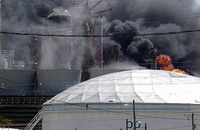Refinery explosion case ends with settlement
The first trial on explosion at BP PLC's Texas City refinery ended in a settlement Tuesday.

The trial over the 2005 accident - which killed 15 people, injured 170 and was the worst accident in the gas and chemical industry in almost 15 years - began Sept. 5. It was the only one of hundreds of lawsuits from the blast to reach the courtroom.
"It occurred overnight," BP spokesman Neil Chapman said after the deal was announced in court. "We don't talk about the settlements. All I can say is we've worked since the explosion to settle so people don't have to go to court."
BP declined to provide details on the suit. More than 1,600 other suits have been settled and about 1,200 are pending, Chapman said. Before the latest settlement, the explosion cost the London oil company at least $2 billion (1.44 billion EUR) in compensation payouts, repairs and lost profit.
The plaintiffs gave brief, emotional statements after the settlement.
"You can't put it in the paper," said Scott Kilbert, a 48-year-old instrumentation supervisor for construction company JE Merit who said he suffered back problems, hearing loss and post traumatic stress disorder in the blast.
"I'm disappointed that I didn't get to look them in the eye and tell them what I feel," said plaintiff David Wilson of Santa Fe, Texas, who suffered similar injuries along with his wife, Nara. Wilson, who worked for a mechanical contracting company, spoke briefly before walking away sobbing. He and his wife had filed separate suits.
The fourth plaintiff, Rolando Bocardo, a 41-year-old instrument fitter from Baytown, wept and said he was too emotional to talk.
Their attorney, Brent Coon, said he hopes BP learned a lesson, but that no amount of money can compensate for the pain and suffering of his clients.
"They have emotional scars worse than any physical scars," he said. "When you see your buddies, co-workers, friends disintegrate before you, the psychological impact of being thrown into that kind of inferno - hell on earth - no one would understand."
The explosion at the plant, located about 40 miles (65 kilometers) southeast of Houston, occurred after a piece of equipment called a blowdown drum overfilled with highly flammable liquid hydrocarbons.
The excess liquid and vapor hydrocarbons were then vented from the drum and ignited as the isomerization unit - a device that boosts the octane in gasoline - started up. Alarms and gauges that were supposed to warn of the overfilled equipment didn't work properly.
The U.S. Chemical Safety and Hazard Investigation Board, one of several agencies that probed the accident, found BP fostered bad management at the plant and that cost-cutting moves by BP were factors in the explosion.
BP released an internal report in May that said the plant's culture seemed to ignore risk, tolerate noncompliance and accept incompetence.
The brief trial featured testimony from Don Parus, the plant's former manager, who defended the company's safety record and denied assertions that profits drove delays in repairs. Coon tried to contrast Parus' comments with a study two months before the blast in which workers told of various safety problems at the plant.
Parus, who is on paid administrative leave, said he was surprised by many employee comments in the report, which he had requested. Parus also told jurors that before the accident, BP did not recognize the risk of placing trailers around the isomerization unit.
All 15 deaths in the accident happened in the two trailers closest to the blast site. Since the explosion, BP has removed all temporary structures from the refinery.
A fifth lawsuit that was also set to be tried, filed by the estate of a contract worker whose suicide was attributed to trauma from the accident, was settled just before the trial began.
The blast was the deadliest in the U.S. gas and chemical industry since an explosion at an Arco Chemical Co. plant in nearby Channelview killed 17 people in 1990.
Texas City is the site of the worst industrial accident in U.S. history. In 1947, a fire aboard a ship at the Texas City docks triggered an explosion that killed 576 people.
Subscribe to Pravda.Ru Telegram channel, Facebook, RSS!


